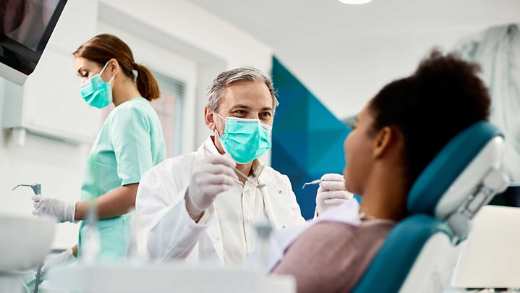Dental trauma
Dental trauma is when your teeth, soft tissue in your mouth or jawbone are physically damaged. Early treatment gives you the best chance of recovery.

It might surprise you to know that if you’ve had an accident that’s hurt your mouth in some way, it’s the dentist you need to call, rather than the doctor.
Your dentist is a good starting point to diagnose your specific mouth problem or refer onwards if your medical problem is more complex.
They’re used to dealing with traumatic injuries and are likely to have a more detailed knowledge of the mouth - not just the teeth and gums but the nerves, ducts, blood vessels and salivary glands.
What is dental trauma?
Dental trauma is the term used when a tooth gets knocked out or broken, or there’s a physical injury to the soft tissue in the mouth, or to the alveolar bone (the bone that holds the tooth sockets). Your gums, cheeks, lips and tongue are the soft tissue and injury to any of these or your teeth can be very painful and may require emergency treatment.
Causes of dental trauma
All sorts of incidents can lead to mouth injuries, and the resulting dental treatment can be quite complex. It won’t come as a surprise either that more than one in ten children have experienced some form of dental trauma. Footnote [1]
Typically, causes of dental trauma can include accidents, playing sport, a vehicle collision or a fight (physical abuse).
With any one of these scenarios, your dentist will need to know the background behind the injury – things like concussion if you’ve taken a blow to the head, or infection (a dog bite for example) may well affect how your injury is treated.
Types of dental trauma
There’s a whole range of dental traumas and if you’re unfortunate you might suffer more than one type of injury.
Soft tissue damage inside the mouth - cuts, bruises, lacerations and punctures – are common and can cause rapid swelling and bleeding that need to be treated quickly. But it’s damage to teeth that’s most often reported, making up the majority of incidents.
Damage to teeth could be any of the following:
- A broken tooth – which will need repairing to protect your tooth and nerves from further damage
- A cracked tooth – where the dentist may need to perform a root canal to repair the damage
- A loose tooth – where the tooth will need to be immobilised to stabilise it
- A knocked-out tooth – this requires emergency dental care
- Tooth jammed into the socket – this may need surgical repositioning
The course of treatment you’d need would depend on the nature of the injury, where it is in your mouth and how severe the damage is.
How to save a knocked-out tooth
If you’re unfortunate enough to lose a tooth in this way and still have it, then you’ll most likely be wondering if it can be saved and put back in. It’s quite reassuring to know that in right circumstances, your tooth can be reunited with the rest of your teeth, but you’ll need to act fast.
If it happens and you’re able to put it straight back in the socket in your mouth (make sure it is clean), then that’s the first thing to do before heading to the dentist. You’re reducing the chance of infection and further damage to the tooth. If you can’t do this then the next best thing is to pop it in small pot of your saliva, or milk. The NHS has guidelines on the procedure for a knocked-out tooth and you can call NHS 111 for advice over the phone if you can’t immediately speak with your dentist. Footnote [2]
Use your cover to pay for your emergency dental visit
It can be frightening when you have a serious mouth injury. Phoning for an appointment with an emergency dentist is likely to be the quickest way to be treated, and depending on your symptoms you’ll be treated immediately or shortly afterwards.
You can get dental cover depending on the options you choose when you apply. Our core cover includes surgery on teeth when it’s carried out in a hospital. Though this won’t be covered if you choose our reduced outpatient option.
You can also enhance your basic cover for an additional cost with our dental and optical add-on, which covers you for routine dental treatment, accidental dental injury and optical benefit.
You can also make a claim on your health insurance, through MyAviva, over the phone, or online.
Once we’ve confirmed your claim meets the terms of your policy, we’ll step up and pay for the treatment directly, so you don’t have to worry about the fees.
It’s good to have one less thing to worry about. It takes Aviva.
Next article
Worried about GP and hospital wait times?
Here's how quickly you could get treated with health insurance.



